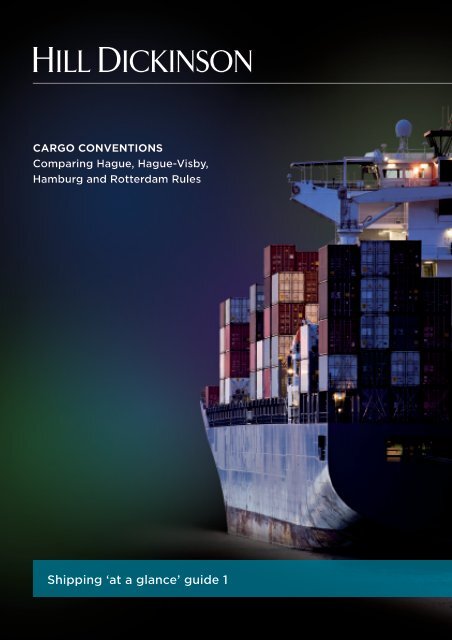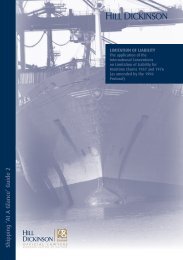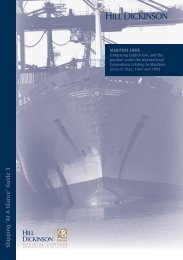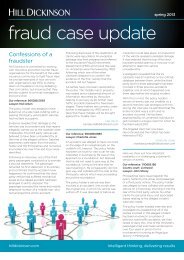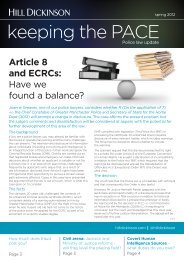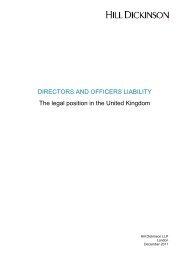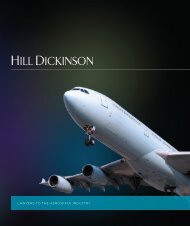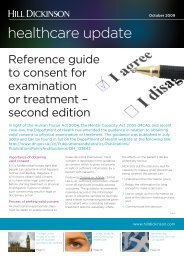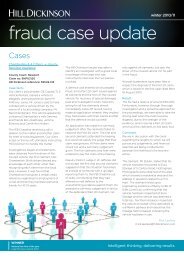At a glance guide 1 - Hill Dickinson
At a glance guide 1 - Hill Dickinson
At a glance guide 1 - Hill Dickinson
You also want an ePaper? Increase the reach of your titles
YUMPU automatically turns print PDFs into web optimized ePapers that Google loves.
CARGO CONVENTIONS<br />
Comparing Hague, Hague-Visby,<br />
Hamburg and Rotterdam Rules<br />
Shipping ‘at a <strong>glance</strong>’ <strong>guide</strong> 1
Cargo Conventions (incorporating the Rotterdam Rules 1 )<br />
Contents<br />
Section:<br />
Page No.<br />
Parties to the Conventions and the Countries which apply the Rules 3-4<br />
A comparison of the Rules 5-12<br />
1. Which voyages covered? 5<br />
2. Which contracts covered? 5<br />
3. Geographical application 5<br />
4. Who is the carrier? 5<br />
5. Contract and tort claims 5<br />
6. Carrier’s general duty of care 5<br />
7. Carrier’s defences 6<br />
8. Burden of proof 7<br />
9. Fire 7<br />
10. Live animals 7<br />
11. Deck cargo 7<br />
12. Dangerous cargo 8<br />
13. Limits of liability 8<br />
14. Loss of right to limit liability 8<br />
15. Lower limits by agreement 9<br />
16. Higher limits by agreement 9<br />
17. Deviation 9<br />
18. What is the effect of statements in the B/L? 9<br />
19. What information must the B/L contain? 9<br />
20. Duties of shipper in supplying carrier with information 10<br />
21. Letters of indemnity 10<br />
22. Notification of damage 11<br />
23. Consequences of failing to notify carrier of loss under 22 above 11<br />
24. Limitation of action 11<br />
25. Jurisdiction 11<br />
26. Arbitration 12<br />
27. General average 12<br />
28. Provisions which conflict with the Rules 12<br />
Whilst care has been taken in the preparation of this <strong>guide</strong>, the matters referred to herein are subject to change and no liability or responsibility is accepted by anyone for any<br />
errors or omissions which may exist in it. The contents of this booklet are descriptive only and should not be used as a substitute for legal advice.<br />
© <strong>Hill</strong> <strong>Dickinson</strong> LLP<br />
1<br />
Not yet in force.
Parties to the Conventions and the Countries which<br />
apply the Rules<br />
l SDR Protocol<br />
n By application of local law<br />
Albania<br />
Algeria<br />
Angola<br />
Antigua & Barbuda<br />
Hamburg<br />
Hague<br />
Hague<br />
Hague<br />
Finland Hague-Visby l<br />
France Hague-Visby l<br />
Gambia<br />
Hamburg<br />
Georgia<br />
Hamburg<br />
3<br />
Argentina Hague/Hague-Visby n<br />
Aruba Hague n<br />
Australia Hague-Visby/Hamburg n<br />
Austria<br />
Hamburg<br />
Bahamas<br />
Hague<br />
Bahrain Hague-Visby n<br />
Bangladesh Hague n<br />
Barbados<br />
Hamburg<br />
Belgium Hague-Visby l<br />
Belize<br />
Hague<br />
Bermuda Hague-Visby l<br />
Bolivia<br />
Hague/Hamburg<br />
Botswana<br />
Hamburg<br />
Brazil Hague n<br />
British Virgin Islands Hague-Visby l<br />
Brunei<br />
Hague<br />
Bulgaria Hague n<br />
Burkina Faso<br />
Hamburg<br />
Burundi<br />
Hamburg<br />
Cameroon<br />
Hamburg<br />
Canada Hague-Visby/Hamburg n<br />
Cape Verde<br />
Hague<br />
Cayman Islands Hague-Visby l<br />
Chile<br />
Hamburg<br />
China Hague-Visby/Hamburg n<br />
Colombia Hague/Hamburg n<br />
Congo, Democratic Republic of Hague<br />
Croatia Hague-Visby l<br />
Cuba<br />
Hague<br />
Cyprus<br />
Hague<br />
Czech Republic<br />
Hamburg<br />
Denmark Hague-Visby l<br />
Dominica<br />
Hague<br />
Dominican Republic<br />
Hamburg<br />
Ecuador<br />
Hague-Visby<br />
Egypt Hamburg l<br />
Estonia Hague n<br />
Falkland Islands<br />
Hague-Visby<br />
Fiji<br />
Hague<br />
Germany Hague-Visby n<br />
Ghana<br />
Hague<br />
Gibraltar Hague-Visby l<br />
Greece Hague-Visby l<br />
Grenada<br />
Guinea<br />
Guinea-Bissau<br />
Guyana<br />
Hague<br />
Hamburg<br />
Hague<br />
Hague<br />
Hong Kong Hague-Visby l<br />
Hungary<br />
Hamburg<br />
Iceland Hague-Visby n l<br />
India Hague/Hague-Visby n l<br />
Indonesia Hague Visby n<br />
Iran<br />
Hague<br />
Iraq Hamburg n<br />
Ireland<br />
Hague-Visby<br />
Israel Hague/Hague-Visby n l<br />
Italy Hague-Visby l<br />
Ivory Coast<br />
Jamaica<br />
Hague<br />
Hague<br />
Japan Hague-Visby l<br />
Jordan<br />
Kazakhstan<br />
Kenya<br />
Hamburg<br />
Hamburg<br />
Hamburg<br />
Korea (South) Hague-Visby n<br />
Kuwait Hague-Visby n<br />
Latvia Hague-Visby n<br />
Lebanon<br />
Lesotho<br />
Liberia<br />
Hamburg<br />
Hamburg<br />
Hamburg<br />
Lithuania Hague-Visby l<br />
Madagascar<br />
Malawi<br />
Malaysia<br />
Hague<br />
Hamburg<br />
Hague<br />
Malta Hague n<br />
Mauritius<br />
Hague<br />
Mexico Hague-Visby l<br />
Monaco<br />
Hague<br />
Montserrat Hague-Visby l
Cargo Conventions<br />
Morocco<br />
Hamburg<br />
Mozambique<br />
Hague<br />
Netherlands Hague-Visby l<br />
Slovenia<br />
Solomon Islands<br />
Somalia<br />
Hague<br />
Hague<br />
Hague<br />
New Zealand Hague-Visby l<br />
Nigeria<br />
Hamburg<br />
Norway Hague-Visby l<br />
Oman Hague-Visby n l<br />
Pakistan Hague n<br />
Panama Hague n<br />
Papua New Guinea<br />
Hague<br />
Paraguay<br />
Hamburg<br />
Peru Hague/Hamburg n<br />
Phillipines Hague n<br />
Poland Hague-Visby l<br />
Portugal Hague/Hague-Visby n<br />
Qatar Hague-Visby n<br />
Romania<br />
Hamburg<br />
Russia Hague-Visby l<br />
Saint Kitts and Nevis<br />
Hague<br />
Saint Lucia<br />
Hague<br />
Saint Vincent and the Grenadines Hamburg<br />
Sao Tome and Principe<br />
Hague<br />
Sarawak<br />
Hague<br />
Senegal<br />
Hamburg<br />
Seychelles<br />
Hague<br />
Sierra Leone<br />
Hamburg<br />
Singapore Hague-Visby l<br />
Slovakia<br />
Hamburg<br />
South Africa Hague-Visby n<br />
Spain Hague-Visby l<br />
Sri Lanka<br />
Hague-Visby<br />
Sweden Hague-Visby l<br />
Switzerland Hague-Visby l<br />
Syria<br />
Hamburg<br />
Taiwan Hague-Visby n<br />
Tanzania<br />
Hamburg<br />
Thailand Hague-Visby n<br />
Timor-Leste<br />
Tonga<br />
Trinidad and Tobago<br />
Tunisia<br />
Hague<br />
Hague-Visby<br />
Hague<br />
Hamburg<br />
Turkey Hague n<br />
Turks and Caicos Islands Hague-Visby l<br />
Tuvalu<br />
Uganda<br />
Hague<br />
Hamburg<br />
Ukraine Hague-Visby/Hamburg n<br />
United Arab Emirates Hague-Visby n<br />
United Kingdom Hague-Visby l<br />
United States of America Hague n<br />
Venezuela Hague-Visby/Hamburg n<br />
Vietnam Hague-Visby n<br />
Zambia<br />
Hamburg<br />
4
Hague Rules<br />
Hague-Visby<br />
Rules<br />
Hamburg Rules<br />
Rotterdam Rules<br />
1. Which voyages<br />
covered?<br />
Rules are<br />
silent.<br />
Art X<br />
(a) B/L<br />
issued in a<br />
contracting<br />
state<br />
(b) carriage<br />
from<br />
contracting<br />
state<br />
(c) contract<br />
of carriage<br />
expressly<br />
applies<br />
Rules.<br />
Art 2<br />
(a) B/L issued in a<br />
contracting state<br />
(b) carriage from contracting<br />
state<br />
(c) carriage to contracting<br />
state<br />
(d) B/L provides Rules to<br />
apply.<br />
Art 5<br />
If, according to contract,:<br />
(a) Place of receipt; or<br />
(b) Port of loading; or<br />
(c) Place of delivery; or<br />
(d) Port of discharge<br />
is in a contracting state.<br />
Receipt and delivery (and<br />
loadport and disport) must<br />
be in different States.<br />
2. Which contracts<br />
covered?<br />
Art 1(b)<br />
Bill of lading or “other similar<br />
document of title”.<br />
Not charterparties.<br />
‘Straight’ bills of lading will<br />
be considered as “documents<br />
of title” for the purposes of<br />
the Rules. See The Rafaela S<br />
[2003] 2 Lloyd’s Rep. 113, CA.<br />
Art 1.6<br />
Contract of carriage by sea.<br />
Need not be a B/L or<br />
document of title.<br />
Not charterparties.<br />
Art 1<br />
Contract of carriage “from<br />
one place to another” by sea<br />
and possibly other modes<br />
of transport. Need not be<br />
a transport document or<br />
document of title. Electronic<br />
transport records included.<br />
Art 6<br />
Charterparties excluded.<br />
3. Geographical<br />
application – the<br />
carrier’s period of<br />
responsibility<br />
Art 1(e)<br />
“Covers the period from the<br />
time when the goods are<br />
loaded on to the time when<br />
they are discharged from<br />
the ship”.<br />
Art 4<br />
Carrier is responsible while<br />
in “charge” of the goods at<br />
the port of loading, during<br />
the carriage, and at the port<br />
of discharge i.e. normally<br />
from time taken over from<br />
shipper to time delivered to<br />
consignee. Subject to local<br />
port regulations.<br />
Art 12<br />
From when carrier or other<br />
“performing party” receives<br />
the goods for carriage.<br />
To delivery of the goods.<br />
Unless goods must be<br />
collected/delivered to an<br />
“authority” by operation<br />
of local law. Can alter by<br />
agreement but loading/<br />
unloading is minimum period<br />
of responsibility.<br />
4. Who is the carrier? Art 1(a)<br />
Owner or charterer “who<br />
enters into contract of<br />
carriage with a shipper”.<br />
Art 1.1, Art 10, Art 11<br />
“any person by whom or in<br />
whose name a contract of<br />
carriage has been concluded<br />
with a shipper”. Covers<br />
“actual” and “contractual”<br />
carrier.<br />
Art 1<br />
“a person that enters into a<br />
contract of carriage with a<br />
shipper”.<br />
But, obligations extend to<br />
“performing parties” acting<br />
“at the carrier’s request<br />
or under the carrier’s<br />
supervision or control”.<br />
5. Contract and tort<br />
claims<br />
Rules are<br />
silent. May<br />
apply to just<br />
contract<br />
claims.<br />
(Under<br />
English<br />
law applies<br />
to both<br />
contract and<br />
tort claims.)<br />
Art IV bis<br />
Apply to<br />
contract and<br />
tort claims.<br />
Art 7<br />
Apply to contract and tort<br />
claims.<br />
Art 4<br />
Defences and limits of<br />
liability apply to all cargo<br />
claims for loss, damage or<br />
delay, whether in contract,<br />
tort or otherwise.<br />
5<br />
6. Carrier’s general<br />
duty of care<br />
Art III<br />
1. Carrier must exercise due<br />
diligence before and at<br />
beginning of voyage to:<br />
(a) make ship seaworthy;<br />
(b) properly man, equip and<br />
supply the ship; (cont.)<br />
Art 5.1<br />
Carrier, his servants<br />
and agents must take<br />
all measures that could<br />
reasonably be required to<br />
avoid the event causing loss<br />
and its consequences.<br />
Art 13<br />
Carrier to “properly and<br />
carefully receive, load, handle<br />
stow, carry, keep, care<br />
for, unload and deliver the<br />
goods”, unless specifically<br />
agreed otherwise in (cont.)
Cargo Conventions<br />
(cont.)<br />
(c) make holds etc. fit and<br />
safe for reception, carriage<br />
and preservation of cargo.<br />
2. Carrier must properly and<br />
carefully load, handle, stow,<br />
carry, keep, care for and<br />
discharge goods.<br />
respect of loading, handling,<br />
stowing or unloading.<br />
Art 14<br />
Carrier to exercise due<br />
diligence before, at the<br />
beginning of and during the<br />
voyage by sea to:<br />
(a) make and keep the ship<br />
seaworthy;<br />
(b) properly crew, equip and<br />
supply the ship and keep the<br />
ship so crewed, equipped<br />
and supplied throughout the<br />
voyage; and<br />
(c) make and keep the<br />
holds etc. fit and safe for<br />
the reception, carriage and<br />
preservation of goods.<br />
7. Carrier’s defences Art IV<br />
1. Unseaworthiness – only<br />
defence is for carrier to show<br />
he exercised “due diligence”<br />
to ensure vessel seaworthy<br />
before and at beginning of<br />
voyage.<br />
2. Properly and carefully<br />
load, etc.<br />
The following defences<br />
apply:<br />
(a) Act, neglect or default<br />
of the master, mariner, pilot<br />
or the servants of the carrier<br />
in the navigation or in the<br />
management of the ship.<br />
(b) Fire, unless caused by<br />
the actual fault or privity of<br />
the carrier.<br />
(c) Perils, dangers and<br />
accidents of the sea or other<br />
navigable waters.<br />
(d) Act of God.<br />
(e) Act of war.<br />
(f) Act of public enemies.<br />
(g) Arrest or restraint of<br />
princes, rulers or people, or<br />
seizure under legal process.<br />
(h) Quarantine restrictions.<br />
(i) Act or omission of<br />
the shipper or owner of<br />
the goods, his agent or<br />
representative.<br />
(j) Strikes or lock-outs, or<br />
stoppage or restraint of<br />
labour from whatever cause,<br />
whether partial or general.<br />
(k) Riots and civil<br />
commotions.<br />
(l) Saving or attempting to<br />
save life or property at sea.<br />
(m) Wastage in bulk or<br />
weight or any other loss or<br />
damage arising from inherent<br />
defect, quality or vice of the<br />
goods.<br />
(n) Insufficiency of packing.<br />
(o) Insufficiency or<br />
inadequacy of marks.<br />
(p) Latent defects not<br />
discoverable by due<br />
diligence.<br />
(cont.)<br />
Art 5.1<br />
Carrier must prove he, his<br />
servants or agents, took<br />
all measures that could<br />
reasonably be required to<br />
avoid the occurrence and its<br />
consequences.<br />
Art 17(3)<br />
Must either show absence of<br />
fault on carrier’s part and on<br />
the part of master or crew<br />
of ship, performing parties,<br />
employees etc. or there is<br />
a defence for the following<br />
events:<br />
(a) Act of God.<br />
(b) Perils, dangers and<br />
accidents of the sea or other<br />
navigable waters.<br />
(c) War, hostilities, armed<br />
conflict, piracy, terrorism,<br />
riots and civil commotions;<br />
(d) Quarantine restrictions<br />
or other detention or arrest<br />
not attributable to the<br />
carrier or master or crew<br />
of ship, performing parties,<br />
employees etc.<br />
(e) Strikes, lockouts<br />
stoppages or restraints of<br />
labour;<br />
(f) Fire on the ship;<br />
(g) Latent defects not<br />
discoverable by due<br />
diligence;<br />
(h) Act or omission of the<br />
shipper etc.<br />
(i) Loading, handling etc.<br />
performed by shipper etc;<br />
(j) Inherent defect, quality or<br />
vice of the goods;<br />
(k) Insufficiency or<br />
deficiency of packing/<br />
marking;<br />
(l) Saving or attempting to<br />
save life at sea;<br />
(m) Reasonable measures for<br />
saving property at sea;<br />
(n) Reasonable measures<br />
to avoid damage to the<br />
environment.<br />
6
Hague Rules<br />
Hague-Visby<br />
Rules<br />
Hamburg Rules<br />
Rotterdam Rules<br />
(cont.)<br />
(q) Any other cause arising<br />
without the actual fault<br />
or privity of the carrier, or<br />
without the fault or neglect<br />
of the agents or servants of<br />
the carrier, but the burden of<br />
proof shall be on the person<br />
claiming the benefit of this<br />
exception to show that<br />
neither the actual fault or<br />
privity of the carrier, nor the<br />
fault or neglect of the agents<br />
or servants of the carrier<br />
contributed to the loss or<br />
damage.<br />
8. Burden of proof Rules are unclear (except<br />
under Art IV(2)(q)). Under<br />
English law cargo owner<br />
must establish inference of<br />
unseaworthiness or failure to<br />
properly and carefully carry<br />
the goods, and the carrier<br />
must prove relevant defence<br />
in §7 above.<br />
9. Fire Art III & IV<br />
If due to e.g. poor stowage,<br />
carrier only liable if<br />
caused by his actual fault<br />
or privity. If caused by<br />
unseaworthiness, carrier<br />
liable unless he exercised due<br />
diligence to ensure vessel<br />
seaworthy before and at<br />
beginning of voyage.<br />
Carrier must prove that<br />
reasonable steps to avoid<br />
loss were taken unless<br />
damage is caused by fire<br />
(see 9 below).<br />
Art 5.4<br />
Carrier liable if claimant<br />
proves fire arose from fault<br />
or neglect on the part of<br />
the carrier, his servants or<br />
agents.<br />
Art 17<br />
Claimant to prove that loss,<br />
damage or delay took place<br />
during carrier’s period of<br />
responsibility.<br />
Carrier to prove that cause<br />
or one of the causes of the<br />
loss, damage or delay is not<br />
attributable to its fault or<br />
the fault of any performing<br />
party, master or crew of ship,<br />
employees etc.<br />
Art 17<br />
Similar regime to the<br />
Hague Rules, i.e. no specific<br />
reference to loss by fire,<br />
other than as a defence.<br />
However, note that<br />
carrier’s obligations as to<br />
seaworthiness extend to<br />
“performing parties”.<br />
10. Live animals Art I(c)<br />
Excluded<br />
from Rules.<br />
Art I(c)<br />
Same as<br />
Hague Rules.<br />
cf UK<br />
COGSA<br />
1971, s1(7)<br />
of which<br />
applies<br />
Rules to live<br />
animals.<br />
Art 1.5 and 5.5<br />
Rules apply but carrier not<br />
liable for inherent “special<br />
risks”.<br />
If carrier complies with<br />
shipper’s instructions he will<br />
be presumed not to be liable.<br />
Art 81<br />
Contract of carriage may<br />
exclude or limit obligations/<br />
liability, unless claimant can<br />
prove that loss of or damage<br />
to or delay in delivery<br />
resulted from act or omission<br />
of carrier or performing<br />
party, with the intent to<br />
cause such loss or recklessly.<br />
7<br />
11. Deck cargo Art I(c)<br />
Excluded<br />
from Rules<br />
if stated to<br />
be carried<br />
on deck on<br />
face of B/L.<br />
Undeclared<br />
deck<br />
carriage<br />
may affect<br />
carrier’s<br />
ability to rely<br />
on defences,<br />
although the<br />
carrier may<br />
still rely on<br />
package<br />
(cont.)<br />
Art I(c)<br />
Same as<br />
Hague Rules.<br />
cf UK<br />
COGSA 1971,<br />
S1(7) which<br />
applies Rules<br />
to deck<br />
cargo.<br />
Art 9<br />
Rules do not exclude deck<br />
cargo. Carrier can undertake<br />
deck carriage if agreed with<br />
shipper or accords with the<br />
“usage of a particular trade<br />
or is required by statutory<br />
rules or regulations”. Must<br />
be statement in the B/L<br />
that goods carried on<br />
deck. Failure to agree deck<br />
carriage makes carrier liable<br />
for damage, loss or delay<br />
resulting solely from carriage<br />
on deck. Carrier cannot limit<br />
liability when deck carriage<br />
is in breach of express<br />
agreement to carry below<br />
deck.<br />
Art 25<br />
Rules will apply to deck<br />
cargo so carried if:<br />
(a) carriage required by<br />
law; or<br />
(b) carried in containers; or<br />
(c) In accordance with<br />
contract of carriage or<br />
the “customs, usages or<br />
practices of the trade in<br />
question”.<br />
If not and loss or damage<br />
due to carriage on deck, then<br />
carrier loses entitlement to<br />
defences. Further, carrier<br />
cannot limit liability when<br />
deck carriage is in breach of<br />
express agreement to carry<br />
below deck.<br />
(cont.)
Cargo Conventions<br />
(cont.)<br />
Hague Rules<br />
limitation<br />
under Art<br />
IV, r 5. See<br />
The Kapitan<br />
Petko<br />
Voivoda<br />
[2003] 2<br />
Lloyds Rep.<br />
1, CA.<br />
Hague-Visby<br />
Rules<br />
12. Dangerous cargo Art IV Rule 6<br />
Inflammable, explosive or<br />
dangerous goods if loaded<br />
without knowledge of the<br />
master (or carrier’s agent)<br />
may be discharged, rendered<br />
harmless or destroyed at<br />
shipper’s expense.<br />
If carrier knows of their<br />
nature but they prove<br />
dangerous they may still<br />
be discharged, rendered<br />
harmless or destroyed<br />
without liability on the part<br />
of the carrier, save in general<br />
average.<br />
Hamburg Rules<br />
Art 13<br />
Similar provisions apply and<br />
the shipper is obliged to<br />
mark and label dangerous<br />
goods in a suitable manner.<br />
Rotterdam Rules<br />
Contract particulars to<br />
state goods may be carried<br />
on deck if carrier to have<br />
protection against third<br />
parties acquiring negotiable<br />
transport document.<br />
Art 15<br />
Carrier (or a performing<br />
party) may decline to<br />
receive/load and may<br />
unload, destroy or render<br />
goods harmless.<br />
13. Limits of liability<br />
(a) Goods lost or<br />
damaged<br />
Art IV Rule 5<br />
£100 per<br />
package or<br />
unit unless<br />
value declared<br />
and inserted in<br />
the B/L.<br />
The £100 limit<br />
per package<br />
has been held<br />
to amount<br />
to £100 gold<br />
value (see The<br />
Rosa S [1988]<br />
2 Lloyd’s Rep.<br />
574), often<br />
resulting<br />
in a higher<br />
limit than<br />
the Hague-<br />
Visby Rules<br />
limitation.<br />
Art IV Rule 5<br />
10,000<br />
Poincare<br />
Francs per<br />
package or<br />
unit or 30<br />
Poincare<br />
Francs per<br />
kilo of gross<br />
weight of<br />
damaged or<br />
lost goods<br />
whichever is<br />
higher.<br />
By virtue<br />
of SDR<br />
Protocol<br />
1979 2 SDRs<br />
per kg or<br />
666.67 SDRs<br />
per package.<br />
Art 6<br />
2.5 SDR per kg or 835 SDR<br />
per package or shipping unit.<br />
Art 59<br />
875 SDR per package or<br />
other shipping unit or 3<br />
SDR per kg of gross weight<br />
subject of claim, whichever is<br />
higher, unless value declared.<br />
13. Limits of liability<br />
(b) Goods delayed<br />
No special provisions. Art 6<br />
2.5 x freight payable on<br />
goods delayed, subject to<br />
upper limit of total freight<br />
on all goods or amount of<br />
limitation if goods have been<br />
lost or destroyed under<br />
formula in (a) above.<br />
Art 60<br />
2.5 times freight payable<br />
for goods delayed, not to<br />
exceed limit for total loss<br />
under Art 59.<br />
14. Loss of right to<br />
limit liability<br />
No special<br />
provisions.<br />
Art IV Rule<br />
5(e)<br />
Right to limit<br />
lost if carrier<br />
intends to<br />
cause loss<br />
or is reckless<br />
knowing<br />
loss would<br />
probably<br />
result.<br />
Art 8<br />
Carrier will only lose right to<br />
limit liability if he intended<br />
to cause loss or was reckless<br />
knowing such loss would<br />
probably result. Deck<br />
carriage where expressly<br />
prohibited will result in loss<br />
of right to limit liability.<br />
Art 61<br />
Right to limit lost if the<br />
claimant proves that loss<br />
attributable to a personal act<br />
or omission of the person<br />
claiming limitation done<br />
with the intent to cause<br />
loss or recklessly and with<br />
knowledge that such loss<br />
would probably result.<br />
8
Hague-Visby<br />
Hague Rules<br />
Rules<br />
Art VI<br />
Only permitted where<br />
not an ordinary shipment,<br />
and reasonable in special<br />
circumstances.<br />
Hamburg Rules<br />
Rotterdam Rules<br />
15. Lower limits by<br />
agreement<br />
No specific right to agree<br />
lower limits.<br />
Art 79<br />
Terms which directly or<br />
indirectly exclude or limit the<br />
obligations or the liability of<br />
the carrier will be void.<br />
Art 80<br />
“Volume contracts”<br />
excepted.<br />
16. Higher limits by<br />
agreement<br />
Art V<br />
Permitted if recorded in<br />
the B/L.<br />
Art 6.4 Art 15<br />
Permitted if agreed. Should<br />
be recorded in the B/L.<br />
Art 59<br />
Permitted if agreed between<br />
the carrier and the shipper.<br />
17. Deviation Deviating carrier might lose<br />
right to rely on defences in<br />
Rules and lose right to limit<br />
liability.<br />
Art IV Rule 4 provides<br />
“any deviation in saving<br />
or attempting to save life<br />
or property at sea, or any<br />
reasonable deviation shall<br />
not be deemed to be an<br />
infringement or breach of<br />
the Rules or contract of<br />
carriage”.<br />
No special provisions.<br />
Deviation if it causes loss<br />
is subject to general test<br />
of carrier’s liability (see 6<br />
above).<br />
Art 5.6 exempts a carrier<br />
from liability where he<br />
attempts to save life or<br />
“reasonable measures” are<br />
taken to save property. This<br />
would apply to deviation<br />
as much as any other cause<br />
of loss.<br />
Art 24<br />
Deviation of itself shall not<br />
deprive the carrier of any<br />
defence or limitation, except<br />
to the extent provided in Art<br />
61 (see §14 above).<br />
18. What is the effect<br />
of statements in the<br />
bill?<br />
Art III Rule 4<br />
Prima facie<br />
evidence<br />
of their<br />
accuracy.<br />
Art III Rule 4<br />
Prima facie<br />
evidence<br />
in hands<br />
of shipper,<br />
conclusive<br />
in hands<br />
of third<br />
party, e.g.<br />
consignee<br />
to whom<br />
the B/L is<br />
transferred<br />
in good<br />
faith.<br />
Art 16<br />
Prima facie evidence of<br />
statement in hands of<br />
shipper (whether shipped or<br />
received B/L). Conclusive<br />
in hands of third party who<br />
relies on statements.<br />
If freight is payable by holder<br />
of the B/L failure to state this<br />
is evidence that no freight is<br />
payable.<br />
Art 41<br />
Prima facie evidence of the<br />
carrier’s receipt of the goods<br />
as stated.<br />
Proof to contrary not<br />
admissible where contract<br />
is negotiable or nonnegotiable<br />
but requires it be<br />
surrendered for delivery and<br />
the document is in the hands<br />
of a consignee/third party<br />
acting in good faith.<br />
Art 42<br />
“freight prepaid” conclusive<br />
vis-à-vis third parties (but<br />
not the shipper).<br />
9<br />
19. What information<br />
must the bill contain?<br />
Art III Rule 3<br />
(a) Leading marks necessary<br />
for identifying goods.<br />
(b) Number of packages or<br />
pieces, or the quantity or<br />
weight as the case may be,<br />
as furnished by the shipper.<br />
(c) The apparent order and<br />
condition of the goods.<br />
Provided that no carrier,<br />
master or agent of the carrier<br />
shall be bound to state or<br />
show in the B/L any marks,<br />
number, quantity, or weight<br />
which he has reasonable<br />
ground for suspecting not<br />
accurately to represent the<br />
goods actually received, or<br />
which he has no reasonable<br />
means of checking.<br />
Art 15<br />
(a) The general nature of the<br />
goods, the leading marks<br />
necessary for identification<br />
of the goods, an express<br />
statement, if applicable, as<br />
to the dangerous character<br />
of the goods, the number<br />
of packages or pieces,<br />
and the weight of the<br />
goods or their quantity<br />
otherwise expressed, all such<br />
particulars as furnished by<br />
the shipper.<br />
(b) The apparent condition<br />
of the goods.<br />
(c) The name and principal<br />
place of business of the<br />
carrier.<br />
(d) The name of the shipper.<br />
(e) The consignee if named<br />
by shipper.<br />
(cont.)<br />
Art 36<br />
(a) A description of the<br />
goods.<br />
(b) The leading marks<br />
necessary for identification.<br />
(c) The number of packages/<br />
pieces or the quantity.<br />
(d) The weight, if furnished<br />
by the shipper.<br />
(e) A statement of the<br />
apparent order and<br />
condition.<br />
(f) Name and address of<br />
carrier.<br />
(g) Date when goods<br />
received or loaded or<br />
transport document issued.<br />
(h) Number of originals of<br />
negotiable documents.<br />
(i) Name and address of<br />
the consignee, if named by<br />
shipper.<br />
(cont.)
Cargo Conventions<br />
Hague Rules<br />
Hague-Visby<br />
Rules<br />
Hamburg Rules<br />
Rotterdam Rules<br />
(cont.)<br />
(f) The port of loading under<br />
the contract of carriage by<br />
sea and the date on which<br />
the goods were taken over<br />
by the carrier at the port of<br />
loading.<br />
(g) The port of discharge<br />
under the contract of<br />
carriage by sea.<br />
(h) The number of originals<br />
of the B/L, if more than one.<br />
(i) The place of issuance of<br />
the B/L.<br />
(j) The signature of the<br />
carrier or person acting on<br />
his behalf.<br />
(k) Freight to the extent<br />
payable by the consignee.<br />
(l) The statement referred to<br />
in paragraph 3 of Article 23,<br />
i.e. that carriage is subject to<br />
the convention.<br />
(m) Statement, if applicable,<br />
that the goods shall or may<br />
be carried on deck.<br />
(n) The date or the period of<br />
delivery of the goods at the<br />
port of discharge if expressly<br />
agreed upon between the<br />
parties.<br />
(o) Any increased limit<br />
or limits of liability where<br />
agreed.<br />
If the carrier is unable to<br />
state any of the matters in<br />
(a) above he should express<br />
his omission on the B/L.<br />
(j) Name of the ship (if<br />
specified in contract).<br />
(k) The place of receipt and<br />
(if known) place of delivery.<br />
(l) Port of loading and port<br />
of discharge (if specified in<br />
contract).<br />
20. Duties of shipper in<br />
supplying carrier with<br />
information.<br />
Art III Rule 5<br />
Shipper is deemed to<br />
guarantee accuracy of<br />
statement as to weight and<br />
quantity of cargo. Shipper<br />
to indemnify carrier for loss<br />
resulting from errors.<br />
Art 17<br />
Same as Hague Rules.<br />
Art 31(2)<br />
Shipper is deemed to have<br />
guaranteed the accuracy of<br />
the information provided.<br />
21. Effectiveness of<br />
letter of indemnity<br />
issued by the shipper<br />
for carrier not clausing<br />
bill.<br />
No specific provisions. Void<br />
under English law. (Brown<br />
Jenkinson & Co Ltd -v- Percy<br />
Dalton (Ldn) Ltd [1957] 2<br />
Lloyd’s Rep. 1)<br />
Art 17<br />
Void for B/L in hands of<br />
consignee. Valid against<br />
shipper unless carrier<br />
intended to defraud<br />
consignee. If fraud, carrier<br />
may not limit liability.<br />
Art 39(3)<br />
If the transport document<br />
fails to state the apparent<br />
order and condition of the<br />
goods the carrier receives<br />
them, it is deemed to have<br />
stated that they were in<br />
good order and condition.<br />
Art 30(1)<br />
The shipper is liable for loss<br />
or damage sustained by the<br />
carrier if the carrier proves<br />
that such loss or damage was<br />
caused by a breach of the<br />
shipper’s obligations under<br />
the Convention.<br />
Although a different liability<br />
regime, it looks likely that<br />
the result is similar to the<br />
Hamburg Rules. Query<br />
whether this would survive<br />
Brown Jenkinson if English<br />
law applies.<br />
10
Hague-Visby<br />
Hague Rules<br />
Rules<br />
Art III Rule 6<br />
Notice of loss or damage<br />
must be given in writing to<br />
the carrier or his agent:–<br />
(i) on day of delivery; or<br />
(ii) within 3 days where<br />
damage is latent.<br />
Hamburg Rules<br />
Rotterdam Rules<br />
22. Notification of<br />
damage.<br />
Art 19<br />
Notice of loss or damage to<br />
be given in writing to carrier:<br />
(i) by the working day<br />
following delivery to<br />
consignee; or<br />
(ii) within 15 days of delivery<br />
where damage is latent.<br />
Notice of delay must be<br />
given within 60 days of<br />
delivery.<br />
Carrier must give notice of<br />
complaint to shipper within<br />
90 days of delivery.<br />
Art 23<br />
Notice of loss of or damage<br />
to goods to be given at<br />
time of delivery or within 7<br />
working days after delivery if<br />
damage not apparent.<br />
Notice of loss or damage due<br />
to delay to be given within 21<br />
consecutive days of delivery.<br />
Need not give notice if joint<br />
inspection by receiver and<br />
carrier.<br />
23. Consequences of<br />
failing to notify carrier<br />
of loss, damage or<br />
delay under 22 above.<br />
Art III Rule 6<br />
Prima facie evidence<br />
of delivery of goods in<br />
condition described by B/L.<br />
Art 19<br />
Prima facie evidence<br />
of delivery of goods in<br />
condition described by<br />
B/L. If goods delayed and<br />
complaint not made within<br />
60 days the carrier is<br />
exempted from liability.<br />
Art 23(1) and (2)<br />
Prima facie evidence of<br />
delivery in same condition<br />
as described in the contract<br />
particulars. Failure to give<br />
notice raises presumption<br />
that goods delivered in same<br />
condition as described in the<br />
contract particulars. It does<br />
not affect the right to claim<br />
compensation for loss or<br />
damage nor does it affect<br />
the allocation of the burden<br />
of proof.<br />
24. Limitation of<br />
action.<br />
Art III Rule 6<br />
“Suit” must<br />
be brought<br />
within 1 year<br />
of delivery or<br />
date delivery<br />
should have<br />
taken place.<br />
Art III Rule 6<br />
Same as<br />
Hague Rules.<br />
Art III Rule<br />
6 bis<br />
Indemnity<br />
actions may<br />
be brought<br />
after 1 year;<br />
the period for<br />
commencing<br />
suit to be<br />
determined<br />
by local law<br />
but not to be<br />
less than 3<br />
months after<br />
claim settled<br />
or suit served.<br />
Art 20<br />
Litigation or arbitration to be<br />
commenced within 2 years<br />
from date of delivery of<br />
goods or the last day upon<br />
which the goods should have<br />
been delivered.<br />
Indemnity proceedings may<br />
be commenced after this<br />
period (at least 90 days from<br />
date of commencement of<br />
action against carrier must<br />
be allowed).<br />
Art 62<br />
2 years after delivery or<br />
when goods should have<br />
been delivered.<br />
Art 64<br />
An action for an indemnity<br />
can be brought within the<br />
later of:<br />
(a) time allowed under local<br />
law; or<br />
(b) 90 days after claimant<br />
settled with primary claimant<br />
or was served with process,<br />
whichever is earlier.<br />
Art 65<br />
If carrier not identified on<br />
the face of the transport<br />
document, may institute<br />
proceedings after expiration<br />
of 2 years, within the later of:<br />
(a) the time allowed under<br />
local law; or<br />
(b) 90 days commencing<br />
after the carrier has been<br />
identified or registered<br />
owner or bareboat<br />
charterer has rebutted the<br />
presumption that it is the<br />
carrier.<br />
Ch 14 on Jurisdiction applies<br />
only if the Contracting State<br />
has opted in – if so the<br />
following applies:<br />
11<br />
25. Jurisdiction:<br />
Where can cargo<br />
owner commence<br />
proceedings?<br />
Rules are silent. Art 21<br />
May sue in court of:<br />
(a) principal place of<br />
business of carrier;<br />
(b) place contract was made;<br />
(c) port of loading;<br />
(d) port of discharge;<br />
(cont.)<br />
Art 66<br />
(a) the domicile of the<br />
carrier;<br />
(cont.)
Cargo Conventions<br />
Hague Rules<br />
Hague-Visby<br />
Rules<br />
Hamburg Rules<br />
Rotterdam Rules<br />
(cont.)<br />
(e) place designated by<br />
contract of carriage;<br />
(f) place of arrest of vessel.<br />
This may be challenged by<br />
the carrier if he submits to<br />
one of the other jurisdictions<br />
and provides security for<br />
the claim.<br />
(b) the place of receipt under<br />
the contract of carriage;<br />
(c) the place of delivery<br />
under the contract of<br />
carriage;<br />
(d) port of loading or port of<br />
discharge;<br />
(e) where agreed between<br />
shipper and carrier. Agreed<br />
jurisdiction will be “exclusive”<br />
under certain circumstances,<br />
including volume contracts.<br />
Art 70<br />
Arrest does not convey<br />
substantive jurisdiction.<br />
26. Arbitration Rules are silent. Art 22<br />
Arbitration agreement<br />
permitted. If incorporating<br />
charterparty arbitration<br />
clause, must be comprised in<br />
B/L as “special annotation”.<br />
Claimant may choose where<br />
to commence arbitration<br />
from:<br />
(a) place where defendant<br />
has principal place of<br />
business;<br />
(b) place where contract<br />
was made;<br />
(c) port of loading;<br />
(d) port of discharge; or<br />
(e) place specified in<br />
arbitration clause.<br />
Ch 15 on Arbitration applies<br />
only if the Contracting State<br />
has opted in – if so the<br />
following applies:<br />
Art 4<br />
Defences and limits of<br />
liability apply to arbitral<br />
proceedings.<br />
Art 75<br />
Parties may agree to refer<br />
disputes to arbitration.<br />
27. General average Art V<br />
“Nothing in these Rules<br />
shall be held to prevent the<br />
insertion in a bill of lading<br />
of any lawful provision<br />
regarding general average.”<br />
28. Provisions which<br />
conflict with the Rules.<br />
Art III Rule 8<br />
Void.<br />
Art 24<br />
“The provisions of this<br />
Convention relating to the<br />
liability of the carrier for loss<br />
of or damage to the goods<br />
also determine whether<br />
the consignee may refuse<br />
contribution in general<br />
average.”<br />
Art 23.1<br />
Void and compensation may<br />
be payable where claimant<br />
has suffered a loss: see Art<br />
23.4.<br />
Art 84<br />
“Nothing in this Convention<br />
affects the application of<br />
terms in the contract of<br />
carriage or provisions of<br />
national law regarding the<br />
adjustment of GA.”<br />
Art 79<br />
Void to the extent that:<br />
(a) it excludes or limits the<br />
obligations or the liability<br />
of the carrier or maritime<br />
performing party; and<br />
(b) it excludes, limits or<br />
increases the obligations or<br />
the liability of the shipper,<br />
consignee, controlling party,<br />
holder or documentary<br />
shipper.<br />
12
About <strong>Hill</strong> <strong>Dickinson</strong><br />
The <strong>Hill</strong> <strong>Dickinson</strong> Group offers a comprehensive range of legal<br />
services from offices in London, Piraeus, Singapore, Liverpool,<br />
Manchester and Chester. Collectively the firms have more than<br />
1,100 people, including 160 partners.<br />
<strong>Hill</strong> <strong>Dickinson</strong>’s marine expertise is internationally renowned.<br />
The firm is also a major force in insurance and is well respected<br />
in the company and commercial arena. It has an award-winning<br />
property practice and is widely regarded as a leader in the fields<br />
of commercial litigation, employment, intellectual property, NHS<br />
clinical/health-related litigation and private client.<br />
<strong>Hill</strong> <strong>Dickinson</strong> LLP is a limited liability partnership<br />
www.hilldickinson.com<br />
London Piraeus Singapore Liverpool Manchester Chester


